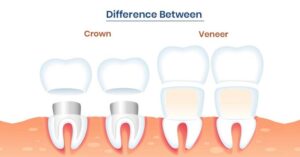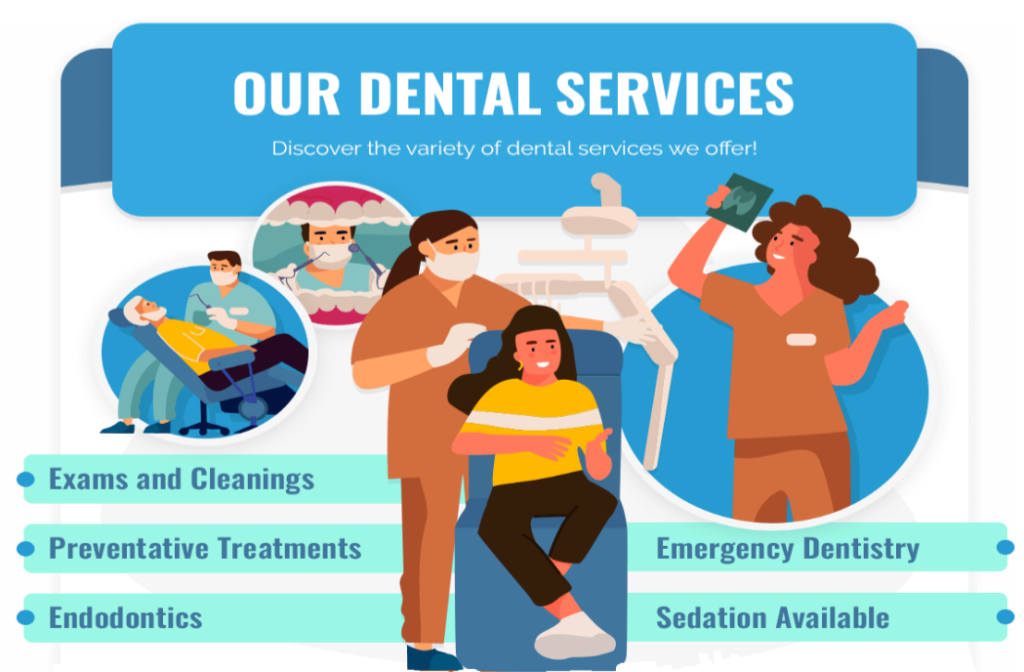Veneers vs Crowns: What’s the Difference?

Difference between veneers and crowns?
When it comes to improving your smile or resolving dental issues, veneers and crowns are popular options. Understanding their distinctions will help you make the best decision for your Dental needs and cosmetic goals.
What are dental veneers?
Veneers are thin, custom-made coverings for the front surfaces of your teeth. They are often constructed of porcelain or resin and are effective for treating discoloration, minor misalignment, and chipped teeth. Veneers provide a cosmetic boost while requiring minimum alterations to your original tooth structure.
Types of veneers:
Porcelain veneers: These are strong and provide a natural, tooth like appearance. They are stain-resistant and offer a long-term solution.
Composite Veneers: Made from tooth-colored resin, these are a less expensive choice. However, they may stain and wear out faster than porcelain veneers.
What are dental crowns?
Dental crowns, also known as caps, completely cover the tooth and restore its shape, size, and function. Crowns are commonly utilized when a tooth has been severely damaged or compromised. They safeguard and strengthen the tooth, enhancing its function and look.
Types of Crowns:
Metal crowns, made of metals such as gold or platinum, are extremely strong and long-lasting. They are more visible due to their shiny color.
Porcelain Crowns: These match the natural color of your teeth, making them suitable for visible areas, although they may not be as long-lasting as metal crowns.
Porcelain-Fused-to-Metal (PFM) Crowns: These have the strength of metal and the natural appearance of porcelain.
Ceramic Crowns: Because of their natural appearance, ceramic crowns are ideal for front teeth; nevertheless, they may not withstand heavy chewing.
Resin crowns are a less expensive option, but they are less durable and more likely to shatter.
Veneers and crowns differ in their purpose and coverage.
Veneers: Veneers are primarily intended for cosmetic purposes and cover only the front surface of the teeth, making them excellent for minor concerns, particularly with front teeth.
Crowns give complete coverage and are used to restore teeth that have been severely damaged or compromised. They provide strength, durability, and protection.
Preparation and procedures:
Veneers are less intrusive, with only a small amount of the tooth’s surface removed.
Crowns require further tooth shaping to guarantee a correct fit.
Advantages and disadvantages of veneers vs crowns
Veneers:
Pros: Minimal tooth preparation, natural appearance, and low invasiveness.
Cons: Not suitable for seriously damaged teeth, may not last as long as crowns, and can be expensive (particularly porcelain veneers).
Crowns:
Pros: Full protection for broken teeth, highly sturdy, and suitable for functional teeth.
Cons: Requires more tooth reduction, is more expensive, and may not appear as natural as veneers.
Crowns vs. implants vs. veneers
In place of lost teeth, dental implants provide a more long-lasting option. In order to repair a missing tooth root, they entail putting a titanium screw into the mandible. Implants offer a natural-looking replacement and are quite durable, although they are more expensive and invasive.
Crowns, Laminates, and Veneers
Veneers can be made much thinner than they are with laminate. They might not last as long as porcelain veneers or crowns, but they do require less dental preparation.
Eating with Crowns vs. Veneers
Veneers: They shouldn’t normally interfere with eating, but handling them carefully will prevent chipping.
Crowns: Strong and durable, crowns are designed to endure chewing and biting pressures.
Conclusion
Your dental condition and aesthetic preferences will influence whether you choose veneers or crowns. Veneers are ideal for cosmetic upgrades, while crowns provide superior protection for damaged teeth. It is critical to examine the expenditures, the preparation required, and the long-term outcomes. Consult your dentist to choose the best option for a healthy, beautiful smile.


